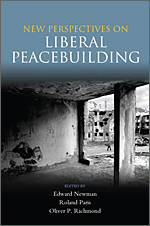Peacebuilding in conflict-prone or post-conflict countries — such as East Timor, Bosnia, Afghanistan and Sierra Leone — aims to prevent the re-emergence or escalation of violent conflict and establish a durable peace. This volume explores and critiques the ‘liberal’ premise of contemporary peacebuilding: the promotion of democracy, market-based economic reforms and a range of other institutions associated with ‘modern’ states as a driving force for building peace. If a liberal peace is viable, is it also legitimate? Or is it, as some claim, a new form of hegemonic control or neo-imperialism? What is the relationship between statebuilding, liberal peacebuilding and the more emancipatory agendas of peacebuilding? Insofar as peacebuilding resembles statebuilding, what or whose vision of the state is being promoted? Is peacebuilding a realist strategic enterprise meant to contain conflict and its international repercussions, or can it resolve the underlying sources of conflict and engage with grassroots actors and issues? Should it address objectives such as emancipation and social justice, and if so how?
New Perspectives on Liberal Peacebuilding provides fresh insights into these debates. Whilst focusing mainly upon cases of major UN peacebuilding, it also considers the implications and record of liberal peacebuilding through a wider range of experiences. It goes beyond the narrow focus on democracy and market economics by interrogating a wider area of peacebuilding activities, including the (re)construction of state institutions. It applies ‘critical’ analysis to the study of peacebuilding, exploring the implications of peacebuilding activities for broader debates about power, legitimacy and international order. It also takes the debate beyond the realms of liberal Western academia by involving scholars and analysts from conflict-prone and post-conflict societies.
“A timely and extremely valuable book by a distinguished group of authors that critically examines the liberal premises of contemporary peacebuilding efforts through a combination of incisive thematic analysis and well-chosen case studies. A ‘must read’ for scholars and practitioners alike.”
—Richard Caplan, Professor of International Relations, University of Oxford
“After some years of controversy, peacebuilding is now generally accepted as an important tool in the conflict resolution toolkit. What is often far from clear, however, is exactly what type of peace is to be built and why. This volume thoughtfully takes apart these questions and puts them back together in new-and sometimes unexpected-ways.”
—Simon Chesterman, Global Professor and Director, NYU School of Law Singapore Programme
“Timely, wide-ranging in scope, and hard-hitting in content, this book is crucial reading for those involved in policy and academic discussion on the ‘liberal’ framing of international peacebuilding interventions. The questions raised regarding the liberal nature of these policy interventions, their strategic coherence, their viability and their goals, are far too important to be ignored.”
—David Chandler, Professor of International Relations, University of Westminster
Edward Newman is Senior Lecturer in the Department of Political Science and International Studies, University of Birmingham, UK. Roland Paris is University Research Chair in International Security and Governance, University of Ottawa, Canada. Oliver P. Richmond is Professor of International Relations and Director of the Centre for Peace and Conflict Studies, University of St Andrews, UK.
Table of contents
Part I: Themes
- Introduction, Edward Newman, Roland Paris and Oliver P. Richmond
- “Liberal” peacebuilding debates, Edward Newman
- Beyond liberal peace? Responses to “backsliding,” Oliver P. Richmond
- Towards life welfare, Michael Pugh
- Does liberal peacebuilding have a future? Roland Paris
- Transitional justice and the liberal peace, Chandra Lekha Sriram
Part II: Cases and experiences
- A critique of the political economy of the liberal peace: Elements of an African experience, M. A. Mohamed Salih
- Earth calling the liberals: Locating the political culture of Sierra Leone as the terrain for “reform,” Ian Taylor
- Afghanistan: Justice sector reform, Astri Suhrke and Kaja Borchgrevink
- Peacebuilding in Bosnia-Herzegovina: Reflections on the development–democracy link, Vesna Bojicic-Dzelilovic
- “We just take what they offer”: Community empowerment in post-war Timor-Leste, Caroline Hughes
- The making of Sri Lanka’s post-conflict economic package and the failure of the 2001–2004 peace process, Rajesh Venugopal
- Beware of liberal peacebuilders bearing gifts: The deviancy of liberal peace in Palestine and Israel, Jason Franks
- Liberal interventions, illiberal outcomes: The United Nations, Western powers and Lebanon, Marie-Joëlle Zahar
- Re-examining liberal peacebuilding in light of realism and pragmatism: The Cambodian experience, Sorpong Peou
- Revisiting the “liberal peace” thesis applied to Central America: New insights for and against the Wilsonian approach, Carlo Nasi

.jpg?x=400&y=600&m=Cover&)





